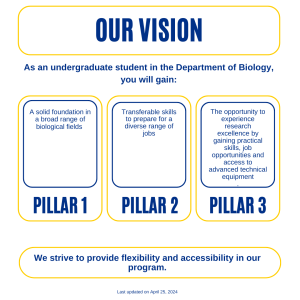
Biology Program Outcomes
Core Biological Concepts
- Demonstrate and apply knowledge of Genetics, Cell Biology, Physiology, Ecology, and Evolution.
- Demonstrate knowledge of the levels of biological organization and their interconnectedness from molecules to ecosystems.
- Recognize the relationship between structure and function at all levels of biological organization.
- Connect biological concepts and scientific research findings to ethical, social, and environmental issues as they pertain to life sciences.
- Explain biological principles, mechanisms, and relationships that generate the diversity of life on earth.
Communication
- Define and use scientific terminology consistent within the field of study.
- Demonstrate effective oral, written, and visual communication.
- Communicate biological principles appropriately in a socially responsible manner to diverse audiences.
- Prepare laboratory reports that effectively and precisely present scientific methods, results, and analysis that are logically explained and interpreted with biological concepts and principles.
Laboratory Skills
- Understand and apply safe laboratory practices.
- Apply scientific knowledge and methodology using biological techniques to develop hypotheses, design experiments, test hypotheses, and critically evaluate findings.
- Analyze and interpret scientific data based on scientific principles and reasoning.
- Demonstrate safe and ethical application of the scientific method.
- Evaluate the limitations of scientific approaches and perform logical troubleshooting.
- Maintain and present detailed and accurate research records.
General Skills
- Demonstrate the ability to work collaboratively in a variety of settings.
- Apply principles of ethical scientific conduct and academic integrity.
- Apply practical and software-based approaches using appropriate units to explore biological problems.
- Perform, evaluate and interpret statistical analyses.
- Identify, evaluate, and select scientific research, evidence, and information from sound and reliable sources based on research literacy.
- Demonstrate inductive and deductive reasoning skills to make scientific and biological connections.
- Critically read scientific texts with a goal to interpret and synthesize scientific arguments.
- Generate meaningful arguments using scientific concepts and principles to enrich and impart knowledge.
- Gain transferable skills (e.g. self-efficacy, time management, work-flow organization, report writing etc.) to operate in a multi-disciplinary environment.
Last updated on 25 April 2024